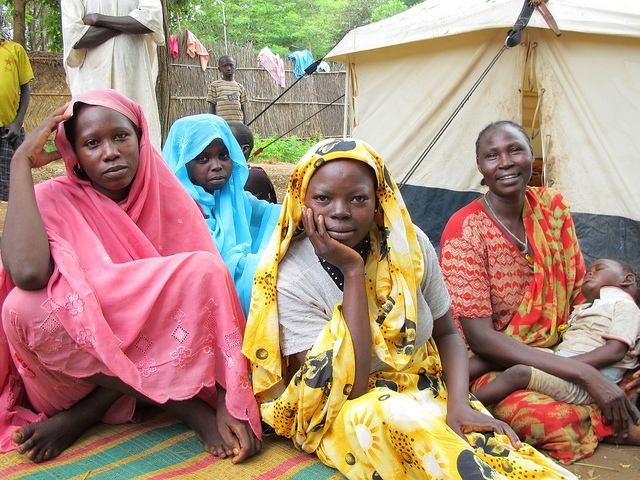
SHERKOLE REFUGEE CAMP, Ethiopia — “We were running, most of the time on foot. Sometimes there is a vehicle, sometimes you have to go straight, sometimes you have to zigzag,” said Zahara, a refugee in Sherkole refugee camp. “It all depends on the security situation.”
Zahara, a Masseleit originally from the city of El Geneina in West Darfur, was describing her second time fleeing a war in Sudan. The first time, she ran from Darfur. The second time, in September, it was from Kurmuk, Blue Nile.
“I’m angry because I lost everything I had. I was barefoot when I ran,” she said, visibly frustrated. “I’ve ran so many times with a child or two on my back.”
After fleeing Darfur in 2003, Zahara and her husband Ahmed spent their first four years moving from place to place in Sudan, until they settled in Blue Nile state. They had been living in Kurmuk for another four years when, according to the couple, fighting broke out in the late hours of September 1, between the northern and southern components of a joint military unit created under the peace agreement signed in 2005. At around 10 a.m. the next day, Kurmuk came under aerial bombardment.
“We ran with no possessions,” said Ahmed. “The harvest season is about to start and we couldn’t even eat a part of our harvest. At times when we were in the bush, we could not find food for our children.”
Reluctant to completely abandon their home, Ahmed, Zahara, and their seven children hid in the grass in the areas around Kurmuk for a month and returned into town whenever they could. “We took our chances. We told ourselves, if we stay in the vicinity we can still return,” she said. But every time they ran back, violence was still ongoing.
Their main concern, Zahara said, was to ensure that their children were fed. “Sometimes we would go back into town to cook food, but before we could have it, the attacks would start again,” she said. “Afterwards, we decided that it was hopeless, and we have to cross [the border].”
Of the many Blue Nile refugees who have sought haven in Sherkole refugee camp, a sizable population previously fled insecurity in Darfur—only to experience another violent uprooting in Blue Nile eight years later.
Musa, another refugee Enough spoke to, was originally a resident of Nyala, North Darfur.
“The reason I left Darfur is obvious,” he said. After raising his children, Musa had moved to Sali, a town just north of Kurmuk, where he opened a coffee shop to make a living. He had been there for four months, when he heard an attack in the nearby town of Dindiro. Because of his age, he decided to leave before fighting had reached him.
“I had to run when the birds came,” Musa said, in reference to the Antonov planes he heard were bombing Dindiro. While walking to the border, he heard an attack on Sali.
For this twice-displaced population, it was natural to draw comparisons to the conflict they experienced in Darfur while reflecting on their experiences in Blue Nile.
“The mode of attack in Darfur was different. People were entering houses and slaughtering,” said Zahara. “Here, it is about terrorizing people with the planes. (…) There are no ground troops in Blue Nile. If there are ground troops, the war may become like Darfur. But there is no guarantee they will not come, that is why we ran.”
But even if the tactics of war seemed to differ, for both Ahmed and Musa, it seemed that the conflict in Blue Nile was only a continuation of the same conflict that began in Darfur.
“The same war,” prompted us to flee, Musa said. “We are the blacks, from eastern Sudan to Kassala, through Blue Nile, Nuba Mountains and Darfur, all the way to Chad. We are the owners of this country and we have been mistreated. So my question is, is anybody going to protect us?”
This post is part of a series based on Enough interviews with Blue Nile refugees in Sherkole refugee camp and Kurmuk, Ethiopia. Details of these testimonies are impossible to verify, but accounts Enough heard have been generally consistent. Some names have been changed to protect the identity of the speaker. For background details about the conflict in Blue Nile, read our overview dispatch.
Omer Ismail contributed to this post.
Photo: (From left to right) Khadamalla Ahmed Adam, Igbal Yahya, Jawahir Adam Ibrahim, and Zahara Yagoub Jemma ran from the Blue Nile town of Kurmuk when fighting began. After a month of staying in the vicinity of Kurmuk, they decided to cross the border to seek shelter at Sherkole refugee camp.

